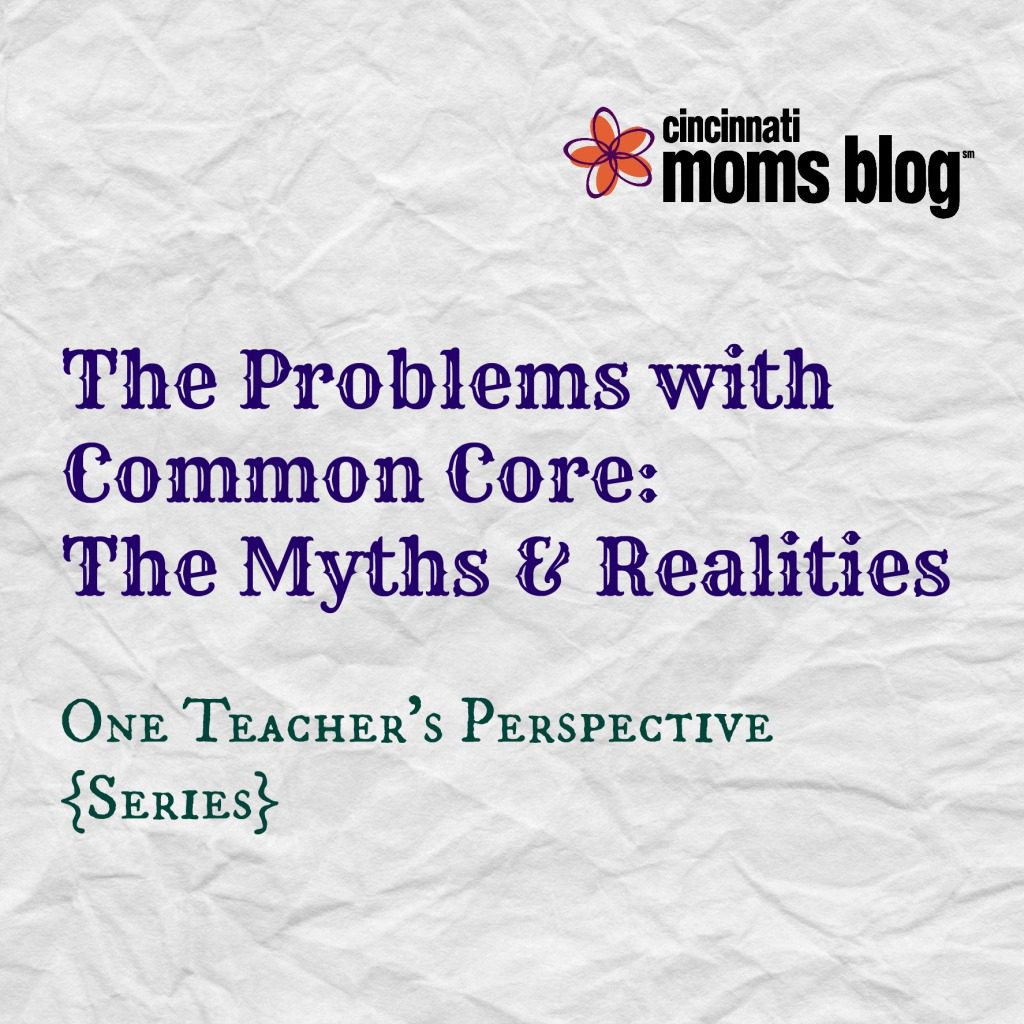We know that opinions and experiences with Common Core vary widely. In this series, our contributor is sharing his thoughts on Common Core. Please note that his opinions and thoughts do not necessarily reflect Cincinnati Moms Blog’s opinions as a whole. We welcome productive and respectful conversation from our readers on this subject in both the comments section below as well as on our Facebook page.
 To read more in this series, including The Problems with Common Core: The Myths and Realities Part One, click here.
To read more in this series, including The Problems with Common Core: The Myths and Realities Part One, click here.
The Harsh Reality
The reality of the situation is that the transition into 100% Common Core is going to be rough. Nearly all of it is going to revolve around the assessment portion of Common Core. Assessments themselves are already a controversial subject in regards to education. While I believe that teachers should be held accountable for the work they do in the classroom, and that collecting data on student performance and progress is useful, very few people actually feel that high-stakes testing at the end of the year is the best measure of that. Of course, what people fail to recognize is that this concept is not unique to the Common Core.
In all honesty, the transition into the Common Core is something that every teacher is a little concerned and stressed about. This transition will not be easy for teachers.
That being said, these challenges are not insurmountable. In a few years, especially once we have lived through the Common Core assessment experience for awhile, we should get to a place of normalcy. If the Common Core does what it sets out to do, the quality of education should actually get better, and our students more skilled.
I would also make the case that in theory, the Common Core absolutely aims to do the right thing, and if given enough time we should see some really good things come from it. The biggest problem is the transition period; especially when you consider we live in a country that demands instant gratification and instant results, which isn’t really fair to demand in this case.
Of course, the most interesting thing about these problems is that these are not the problems parents, families, and politicians are talking about. It seems like people have gone out of their way to find new things to complain about, which actually can’t be attributed to the common core.
Myth #1: Crazy Homework
This is the big one. Check out the following links, as they are just a few of the hundreds examples of parents complaining about the Common Core homework their children are getting.
Here is what you need to understand. First, the Common Core standards are simply a list of things that teachers need to teach and students need to learn. The Common Core standards, despite what every single article just like those tries to tell you, never tell teachers HOW to do that. The Common Core does not provide, describe, endorse or explain methods on how to teach.
These crazy math problems were not created by the Common Core. These are things created by teachers. If you kid brings home a homework assignment like this, it shouldn’t be your job to post a blog post about how stupid Common Core is. It might be more appropriate to write a blog post about how stupid your teacher is. That being said, there is a reason, even if misguided, behind these examples. Remember, the Common Core wants students to be able to explain why they do what they do, and how they do what they do.
Try this. On a piece of paper, write down the process for tying your shoes. It isn’t as easy as actually tying those shoes, correct? The same can be said for math. We teach our kids the process of completing math problems, and we typically learn by doing and practicing it. Math education hasn’t done much in the way of guiding students towards being able to verbalize and explain the process of what they are doing. It’s a struggle just to get kids to show the process they used to get the answer. The crazy methods, the wacky things you are seeing, are teachers attempts at giving students the ability to explain and describe how they do the things they do. But again, those are teacher created materials, and teachers should be held accountable for them, not a list of things that should be taught.
Myth #2: The Government is Taking Over Education
I’ve seen links and mentions referring to Common Core standards as a Federal takeover of public education, as Obama-Core and all sorts of other silly things. People are really getting mad about how the government is getting involved in their children’s education. Well, Common Core neither adds nor takes away from the involvement the government has on education. Education, unless you and your family opt out through charter or private school options, are completely state run entities. Common Core doesn’t change this. The Common Core standards were developed by a consortium of state governors, and board of education professionals. The plan was presented to each state individually, and states individually decided to implement or not. The Federal government has played no role in the creation or implementation of the Common Core, even if individuals employed by the Federal government have spoken in support of the new standards.
Each state had the opportunity to adopt the Common Core (as Ohio did) or reject it (as Indiana did). Ohio adopted these standards following the same steps and processes they used to adopt any previous iteration of state standards. The United States government’s role in this situation doesn’t change in any way.
Myth #3: Common Core Takes Control Away From Schools/Teachers/Parents
This is about as true as writing “Cereal” on your grocery list dictates which box you have to purchase at the grocery store. Again, the Common Core standards are just a list of things teachers should teach, and what students should know. That is it. There are no mandates or directives in regards to what teachers actually do. Schools, the same way they always have, have the ability to choose and implement any sort of curriculum program they desires. Schools completely have the choice to decide what materials get put in front of students. This has not changed.
On the level of teachers, I still write my lesson plans the same way I did before Common Core. I can teach the same stories, the same poems and the same books. I might ask my students questions that are a little bit more complex and a little bit more involved, I might ask them to explain more and find evidence, but I am completely in control of the material I present to my students, and that will not change.
Parents rights also remain the same. If a parent is concerned about what their students are learning or doing in class, they can still go to the teacher, dean, or principle and voice their concerns. They absolutely should, and schools will continue to respond to these concerns as they always do. In reality, nobody ever objects to standards. No parent says, “I have an issue with my student using knowledge of language and its conventions when writing, speaking, reading or listening.” Instead they say things like, “I don’t know if I want my child to read The Giver because I found the scene where the father kills a baby objectionable.” No parent says, “I don’t want my kid to use an understanding of place values so they can round multi-digit whole numbers to any place.” Instead they say things like, “Because my family is Jewish, I don’t think my kid should make a Santa Clause in art class.”
Continuing the Discussion
I hope that I have been able to paint a realistic portrait of what the Common Core standards are, and what they aim to do. I also hope that I’ve been able to give people a more realistic understanding of what is going on, from the perspective of somebody who is dealing with it on a daily basis. There is so much to say, and so much to discuss, and I would love to continue this discussion via the comments section, or responding to questions and comments in the future. I think the Cincinnati Moms Blog provides us an excellent opportunity to hold an effective, and civil conversation.
Regardless of which side of the topic you are one, there are a few areas where we can all find common ground on. We all want our children to receive a top quality education. We all want our children to have the best opportunity to be successful in the future. We all want our children to enjoy and benefit emotionally, academically, and emotionally from their education.












